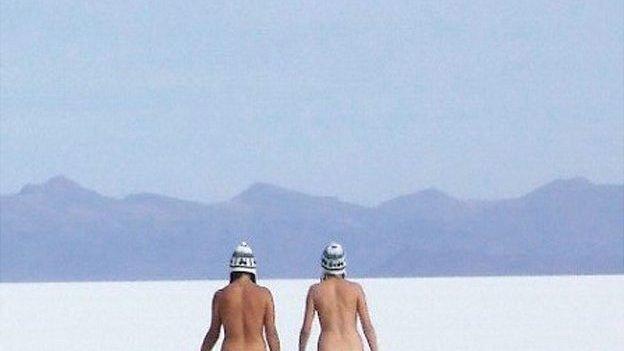Mount Kinabalu is 'our temple and purgatory'
- Published
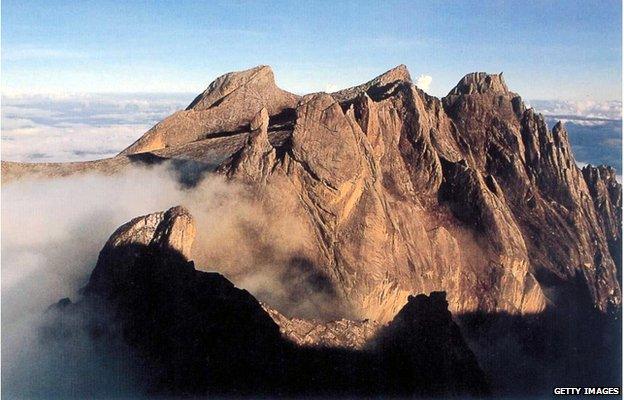
The mountain is estimated to be at least 15 million years old
Controversy erupted this month when a group of backpackers climbing Mt Kinabalu in Sabah, Malaysia, stripped and posed naked for pictures.
Public anger, which first arose when the pictures were posted on social media, later intensified in the aftermath of the 5 June earthquake that killed 18 people, with some locals blaming the tourists for the disaster.
Why is Kinabalu so significant?
With its towering height of 4,095m (13,435ft) and mist-shrouded peak, the 15 million-year-old mountain is one of the most recognisable symbols of Sabah and considered sacred to the state's Kadazan Dusun tribe.
"It is our temple," said Dr Benedict Topin, executive secretary of the Kadazan Dusun Cultural Association.
"When we die, our souls will journey upwards towards our creator in the sky, Kinohiringan. But we are not perfect, so our souls rest on the peak of Kinabalu and await for emancipation. It is like our purgatory."
Priests and priestesses, called Bobolians, help these spirits go to the sky by performing purification rituals.
Kinabalu's name is derived from the tribe's phrase "Aki Nabalu", which means resting place of the souls of the departed.
Locals believe it is also named after a god, Aki Nabalu, who together with another god Odu Nabalu, take care of the mountain.
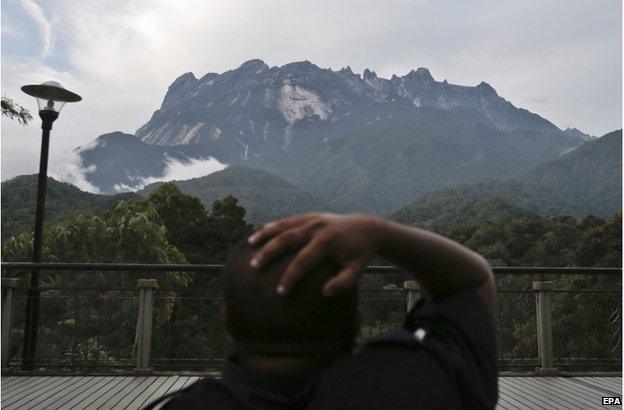
Locals consider Kinabalu as sacred
The mountain has a direct link to the tribe's central belief that the sky deity Kinohiringan and his wife, the earth deity Umunsumundu, together created the universe.
Kinohiringan was embarrassed when his clouds were too small compared with the earth. To soothe his hurt pride, Umunsumundu re-made the world and in the process created Kinabalu, which she designated as the world's centre.
The mountain, on the Unesco World Heritage List,, external is also a rich source of biodiversity, containing half of all Borneo's birds, mammals and amphibian species and two-thirds of Borneo's reptiles.
Visitors are thus often told to treat it with respect.
A spokesman for Sabah's tourism authority told the BBC that local travel agencies and guides usually inform visitors of safety and etiquette guidelines when they sign up for climbing tours.
These guidelines include no smoking, no littering, no shouting, and no cursing at the mountain.
"[The locals believe] if you shout or do not discard rubbish properly, the spirits of the mountain get offended. You are also disturbing the peace of other travellers," said the spokesman.
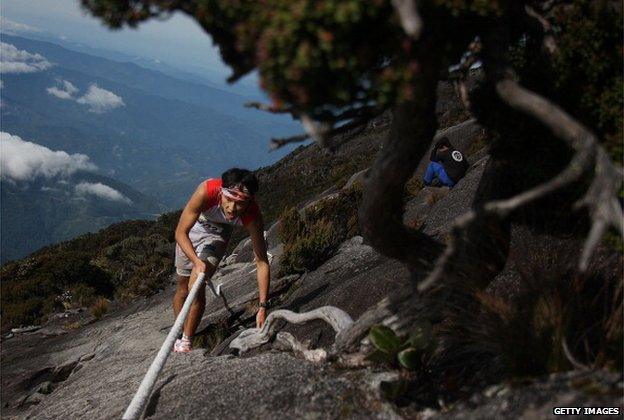
The mountain hosts a popular annual climbathon every year
Who are the Kadazan Dusuns?
Sabah has 33 indigenous groups, of which the Kadazan Dusun are considered the largest, external, making up almost 30% of the population.
The group is actually made of two unified tribes, the Kadazan and Dusun, who are mostly traditional farmers cultivating rice, though hunting and fishing are also part of the culture.
With many villages clustered near Kinabalu, a number also work as mountain guides and in the tourism industry.
Kadazan Dusun members figure prominently in local government and society, particularly the well-known Kitingan clan.
They include Sabah's Deputy Chief Minister Joseph Pairin Kitingan - who recently linked the earthquake to the "nudist tourists" - and his brother, opposition politician Jeffrey Gapari Kitingan.
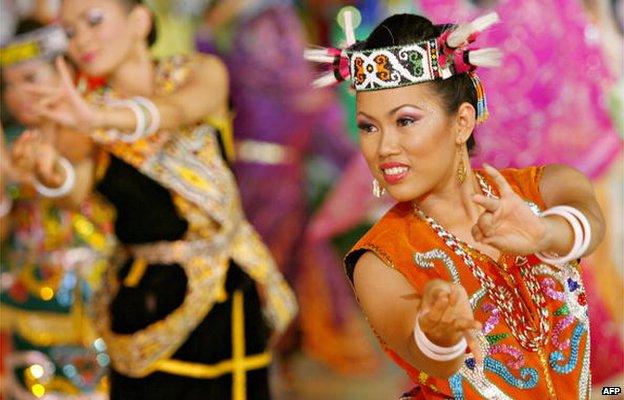
Malaysian Borneo, where Sabah is located, has dozens of different ethnic groups
What rituals do they practise on Kinabalu?
Locals believe that every visit is an intrusion into the world of the spirits and thus they must be placated.
Guides used to perform a ritual called the Monolob at the foot of the mountain before every climb, as a way to appease the mountain gods and spirits and ensure a safe journey.
One of the first documented instances of this ritual was by British administrator Sir Hugh Low, who climbed the mountain in 1851 and saw a guide slaughtering chickens and offering prayers.
With Kinabalu becoming a popular climbing destination, locals now conduct the Monolob just once a year during the tribe's Community Day in December, The New Straits Times., external reported.
A Bobolian makes an offering of seven white chickens accompanied by seven chicken eggs, betel nuts, tobacco, limestone powder, and betel plant leaves.
The Bobolian then leads a chant and the chickens are then slaughtered, cooked, and given to the ceremony participants to eat.
Is this the first controversy on the mountain?
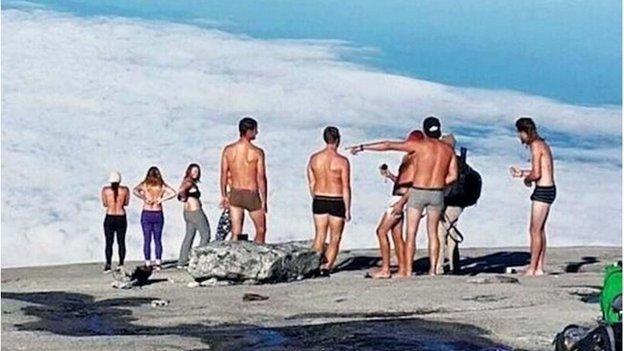
The backpackers had stripped naked after climbing to the summit of Mount Kinabalu on 30 May
The Sabah tourism authority spokesman told the BBC: "There are no other incidents which were this bad.... The worst we saw prior to this were travellers who did not discard their rubbish properly."
Dr Topin said that the stripping incident "is the first case of sacrilege" on the mountain.
"But we have had cases where climbers have been lost and never found, and others who fell to their death. We can only guess that perhaps they did not observe our customs correctly."
Additional reporting by Aaron Wong
- Published12 June 2015
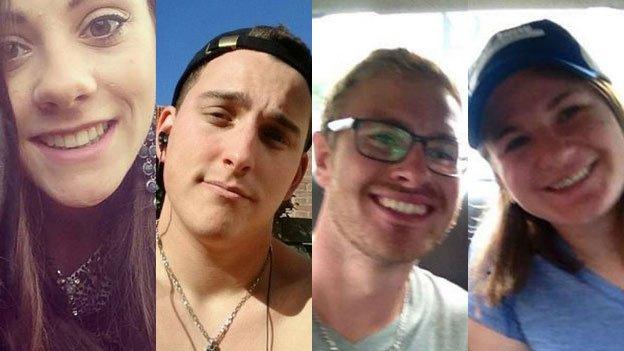
- Published5 June 2015
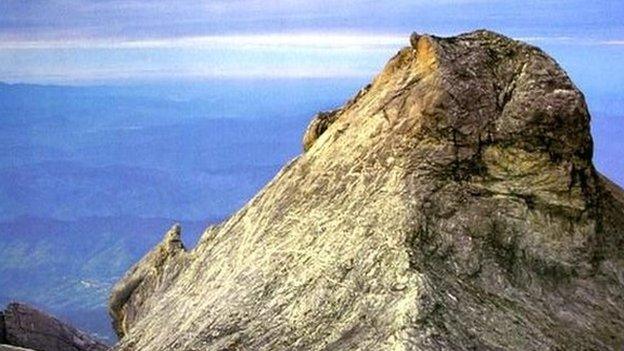
- Published11 June 2015
